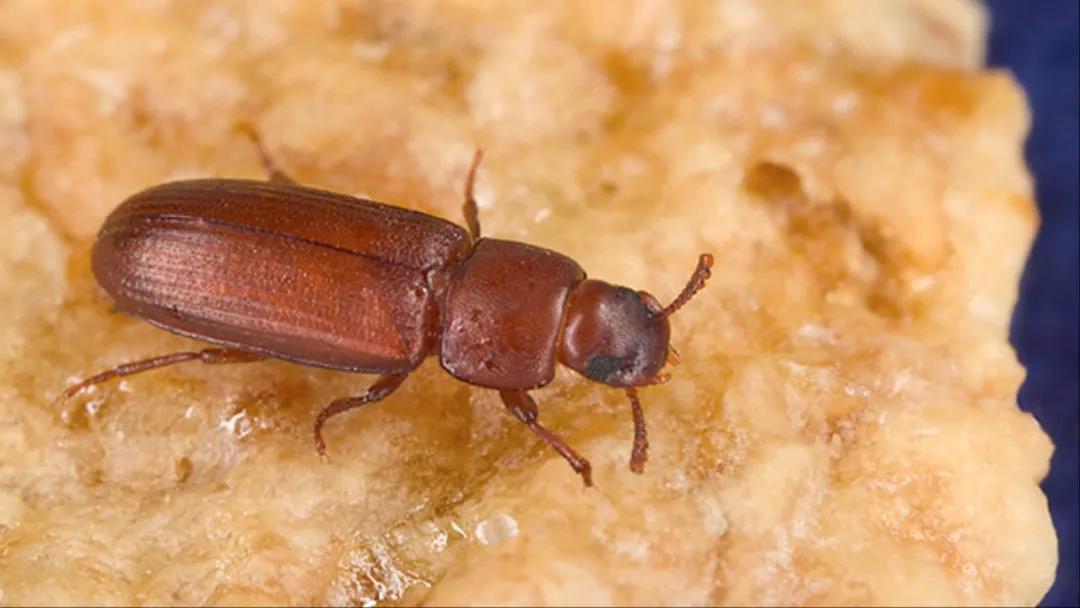随着温度升高,全球昆虫种群数量急剧下降。最新研究发现,全球变暖严重影响了昆虫的生育能力,高温不仅会影响精子的产生,还会影响精子后期的生存。这可能是导致全球昆虫种群数量下降的一个原因。
Male reproductive damage under heat wave conditions could be contributing to biodiversity declines in the Anthropocene.
热浪条件下的雄性生殖损害可能导致人类世生物多样性的下降。

A red flour beetle. Image: USDA
一只赤拟谷盗。图片:美国农业部
Climate change could reduce fertility rates in male insects by at least half, according to a study published Tuesday in Nature Communications. This is bad news for bugs and humans alike, because insects play a crucial role in pollinating our crops and stabilizing many of the food webs and ecosystems that we rely on.
周二发表在《自然通讯》上的一项研究表明,气候变化可能会使雄性昆虫的生育率至少降低一半。这对昆虫和人类来说都是坏消息,因为昆虫在给我们的农作物授粉和稳定我们赖以生存的食物网和生态系统方面起着至关重要的作用。
Led by Kirs Sales, a postgraduate researcher at the University of East Anglia in the UK, the research found that increasingly intense heat waves pose a serious threat to the reproductive fitness of insects worldwide.
由英国东安格利亚大学的研究生研究员Kirs Sales领导的这项研究发现,日益强烈的热浪对全球范围内昆虫的生殖健康构成严重威胁。
'Heat waves reduce male fertility and sperm competitiveness, and successive heat waves almost sterilize males,' Sales and his co-authors wrote in the study. 'This male reproductive damage under heat wave conditions provides one potential driver behind biodiversity declines and contractions through global warming.'
'热浪降低了雄性的生育能力和精子竞争力,连续的热浪几乎会使雄性绝育,'Sales和他的合著者在研究中写道。'在高温条件下,雄性生殖能力的损害是全球变暖导致生物多样性下降和收缩的潜在原因之一。'
The researchers exposed red flour beetles, a commonly studied model organism, to heat wave conditions in a laboratory. A group of 56 males and 55 females spent five days living in sex-segregated petri dishes warmed to 40°C (104°F), which is 5°C hotter than the species' optimal living temperature. A control group of 65 males and 27 females were kept at optimal temperatures of 30°C and 35°C.
研究人员将赤拟谷盗,一种常被研究的模型生物,暴露在实验室的高温条件下。一组56只雄性和55只雌性持续5天生活在性别隔离的培养皿中,温度升高到40°C(104°F),比物种的最佳生活温度高5°C。对照组65只雄性和27只雌性被保持在30℃和35℃的最佳温度。
After these treatments, males were paired off to mate with females. The results were dramatic: The control group was able to produce twice as many offspring as the males subjected to a heat wave, due to the precipitous drop in the latter group's viable sperm count. The results were even more pronounced when beetles were subjected to multiple heat waves. Those males fathered fewer than one percent the number of offspring produced by the control group, resulting in 'almost complete sterility in males,' the team said.
在这些处理之后,雄性与雌性配对交配。结果是戏剧性的:对照组的后代数量是受到热浪袭击的雄性的两倍,由于后者的精子数量急剧下降。当甲虫遭受多重热浪时,结果更加明显。该团队表示,这些雄性产下的后代数量不到对照组的百分之一,导致'雄性几乎完全不育'。
The females that were exposed to heat waves were about as reproductively successful as the control group of females. However, a group of females that mated with males before a heat wave were indirectly affected because the viability of the sperm inside them was reduced by the high temperatures.
暴露在热浪下的雌性与对照组雌性的繁殖成功率一样高。然而,在热浪之前与与雄性交配的雌性受到了间接影响,因为高温降低了它们体内精子的存活能力。
The negative effect on fertility was not confined to beetles that directly experienced the heat waves-their offspring also suffered from higher rates of infertility and shortened lifespans.
对生育能力的负面影响并不局限于直接经历了热浪的甲虫 - 它们的后代也有较高的不育率和较短的寿命。
'Reproductive potential of male offspring was significantly reduced if they had been fathered by males or sperm that had previously experienced thermal stress, and offspring lifespan was shortened if fathers had experienced a heat wave,' Sales and his colleagues said.
'如果先前经历过热应激的雄性或精子生育,则雄性后代的生殖潜能就会显著降低,如果父辈经历过热浪,后代的寿命就会缩短,'Sales和他的同事说。
The study focused on so-called 'cold-blooded' ectotherms, which are organisms that, unlike humans, require external heat sources to control their body temperatures. Because they are so sensitive to thermal shifts, ectotherms are particularly threatened by climate change.
这项研究关注的是所谓的'冷血'外温生物,它们与人类不同,需要外部热源来控制体温。由于它们对温度变化非常敏感,因此它们特别容易受到气候变化的威胁。
But previous research has shown that endotherms, organisms that can generate heat internally like mammals, also suffer reduced fertility in abnormal heat. A 1970 study in the Journal of Animal Science found that male mice exposed to elevated temperatures were about 75 percent less fertile in the near term, though their sperm viability improved once they were removed from heat stress.
但是之前的研究表明,能够在内部产生类似哺乳动物的热量的吸热生物,在异常的高温下也会降低繁殖能力。1970年发表在《动物科学杂志》上的一项研究发现,暴露在高温环境下的雄性小鼠的生育能力下降了75%左右,不过,一旦从高温环境中释放出来,它们的精子活力就会提高。
A 2018 study published in Demography modeled 80 years of birth data in the US, and found that heat waves correlated with decreased birth rates nine to ten months later. However, there is still debate over the degree to which heat influences human male fertility.
2018年发表在《人口学》杂志上的一项研究对美国80年的出生数据进行了建模,发现热浪与9至10个月后的出生率下降相关。然而,对于热量在多大程度上影响人类男性的生育能力仍存在争议。
Regardless, the new study shows that hot temperatures mean less fertility for insects, which is still bad news for humans.
无论如何,新的研究表明,高温意味着昆虫的繁殖能力下降,这对人类来说仍然是个坏消息。
(版权说明,转载自;科学猫科普)
